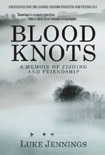|
Blood Knots
A Memoir of Fathers, Friendship, and Fishing
by Luke Jennings
|
 From time to time, a friend recommends a book which, although not on a subject that is likely to be of interest, in this case fishing, strikes an emotional chord because it touches upon deeper issues that you rarely give much thought to. This is such a book. If you’re a Grenadier, past or present, it also paints a moving, affectionate but honest portrayal of Captain Robert Nairac, murdered by the IRA in 1977. From time to time, a friend recommends a book which, although not on a subject that is likely to be of interest, in this case fishing, strikes an emotional chord because it touches upon deeper issues that you rarely give much thought to. This is such a book. If you’re a Grenadier, past or present, it also paints a moving, affectionate but honest portrayal of Captain Robert Nairac, murdered by the IRA in 1977.
The author, Luke Jennings, is a Booker Prize shortlisted author and the Guardian’s dance critic.
Essentially autobiographical, Luke looks at his life through his passion for fishing, his relationship with his father whose war record, hidden from Luke except for the occasional sublime insight from his father and regimental contemporaries, becomes the wellspring of his deep love and admiration, and his friendship with the other mentor in his life, Robert Nairac. The book is also beautifully written by the author who won a Classics scholarship to Oxford; probably too perfect in style and rhythm for the Booker Prize judges and their dreary attachment to ‘ Right On’ English and authors whose early lives had to be a constant struggle.
Fishing is the book’s main theme and like so many sports and interests, gives the author a metaphor for life itself. Fishing in dark, secretive waters ‘as deep as England’, as the Poet Laureate, Ted Hughes put it and whose poem, Pike is one the most mesmerising poems about the grandeur of fishing ever written. And how often does one’s life’s endeavours amount to nothing, like fishing where no amount of preparation, foresight and the perfect cast can overcome the unfairness of life, or just a plain run of bad luck? As the author writes, ‘hunkering on the narrow bank, your knees and the backs of your hands pickling from the nettles, the midges swarming, you looked out over the pond, its surface covered in a thin scum of verdigris coloured weed, were the fish still there? The answer, always the same’.
Luke Jennings writes, ‘If my private domain was fishing, my father’s was the war’. His father was happy to talk about the lighter hearted aspects of war and the doubtful pleasure of censoring other ranks’ letters like the opening sentence of one letter, ‘Dearest Maeve, I want you to know that you and Joan are the best two fucks in Watford’ but became quiet when talking about the experience of battle. That didn’t stop his father reminiscing at odd times and in odd places such as the local supermarket when, faced with a long queue to the till of overweight shoppers, he suddenly said in a loud voice, ‘Those young Nazis manning the 88s at Eindhoven, they would have made short work of this lot’.
It was only after his father’s death that the author discovered the true nature of his father’s war, how he had won the MC and suffered burns in his brewed up tank which caused him to have his hands and face dressed every day for the remainder of his life. As the author writes, ‘Those flames. Perhaps they’re why I’ve spent a lifetime seeking out water’.
As an old Amplefordian, a school that has provided so many officers for the Household Division, the word portrait of Robert Nairac, my first head of school, who became an officer in the Grenadiers, later murdered by the IRA and awarded a posthumous George Cross, is both compelling and unerring in its narrative. It’s easy to say, as I’ve often heard people gossip, that what on earth was Robert Nairac playing at, trying to pass himself off as an IRA sympathiser when Ampleforth, Oxford and the Guards was as recognisable as the Eiffel Tower? Nairac’s was a rare sense of duty, a Catholic of almost medieval devotion, an acolyte of Lawrence of Arabia, a born leader and mesmerising influence on the young Luke Jennings who fell under Robert’s spell when he came to teach at his prep school before going up to Oxford.
Maybe the answer lies in Father Paul Nevill, a legendary headmaster of the school, and his famous response to a zealous mother who asked what the purpose was of an Ampleforth education in later life, to which he smiled and said, ‘At Ampleforth, we prepare our boys for death, not life’. Nairac set a different example to the heroism of the author’s father; but both men in their distinctive ways were examples of love, hope and friendship that all of us seek.
You do not need to fish or even think of taking up fishing to enjoy this original and evocative book.
Paul de Zulueta
atlantic-books.co.uk
|
|